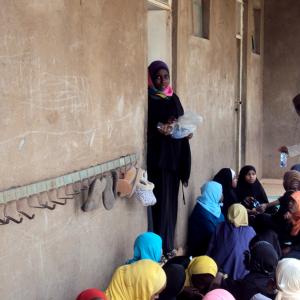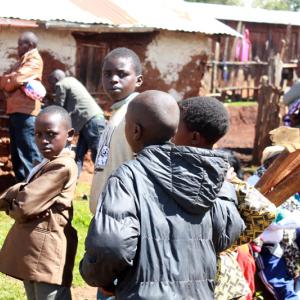Tonny Onyulo writes for Religion News Service.
Posts By This Author
'God Is Peace' Pope Francis Says as He Wraps Up Africa Visit

Image via Drop of Light / Shutterstock.com
Pope Francis wrapped up his six-day trip to Africa in the war-torn Central Africa Republic on Nov. 30 by warning that religious conflicts are spawning civil war, terrorism, and suffering throughout the continent.
“Together we must say no to hatred, to revenge and to violence, especially violence perpetrated in the name of a religion or of God himself,” the pope said in Bangui, the capital.
“Together, we must say no to hatred, to revenge and to violence, particularly that violence which is perpetrated in the name of a religion or of God himself. God is peace, ‘salaam,’ ” the pope said, using the Arabic word for peace.
Some African Catholics Call on Pope to Let Priests Marry

Image via Tonny Onyulo / RNS
Throngs of Roman Catholics are expected to greet Pope Francis when he visits East Africa this week.
But the Rev. Anthony Musaala won’t be a part of the official welcoming delegation.
Two years ago, Ugandan Archbishop Cyprian Lwanga suspended Musaala indefinitely — barring him from administering the sacraments — when Musaala wrote an open letter that challenged his priestly vows of celibacy, condemned sexual abusers among the clergy, and criticized priests who father children and abandon them.
Lwanga said the letter “damages the good morals of the Catholic believers and faults the church’s teaching.”
Al-Shabab Militants Create Chaos, Pain for Somalis
Sitting under a veranda at the former headquarters of Somali Airlines, Ali Bashir sipped coffee and chewed khat, an African herb, as he recounted 15 years of anarchy fomented by al-Shabab Islamic terrorists.
“Life is very hard here,” he lamented.
“There’s nothing to eat and nowhere to work. But the rebels will come and still ask you for money.”
Since Somalia’s central government collapsed in the early 1990s, al-Shabab has emerged as the greatest threat to international efforts to rebuild the east African nation. The al-Qaida-linked militants extort, kidnap, stage terror attacks, and control remote areas of the countryside.
Al-Shabab gained renewed global attention last week, when a small band of militants massacred 148 people at Garissa University College in neighboring Kenya, where they singled out Christians for execution. In 2013, al-Shabab terrorists attacked the Westgate Mall in Nairobi, Kenya, murdering nearly 70.
In the wake of this month’s attack, Somalia President Hassan Sheikh Mohamud called for more cooperation between Kenya and Somalia to eliminate al-Shabab, and Kenyan jets pounded two al-Shabab camps in Somalia.
Bashir, 28, who sold clothing before fleeing here, doubted the Somali government could do much about the terrorist group. He fled to the capital here a few years ago after al-Shabab seized control of a region in the south. He now lives in the old airlines headquarters with 1,000 other families.
“I have grown up in this country without knowing peace or stability,” said Bashir, a father of six.
'I Wish I Could Also Have Died:' Boko Haram Haunts Kids
Memories of Boko Haram’s murderous spree in his Nigerian hometown haunt Tom Gowon, 9, as he sits on a patch of grass at a refugee camp, sipping steaming porridge from a plastic mug.
“I was lucky because I was not killed,” said Gowon, recalling the assault on Baga, Nigeria, in early January.
“But they shot and killed my father. My mother was kidnapped by the militants.”
Children such as Gowon bear the brunt of Boko Haram’s rampage since its fighters kidnapped more than 200 schoolgirls last year and conquered enough territory to declare a caliphate that covers one-fifth of Nigeria.
Where the militants have met resistance, they’ve torched villages and left piles of corpses in their wake.
“There are several camps around here housing many children who have lost their parents in attacks,” said Guy Nanhousngue, a Chadian relief worker who said children make up about half of the Nigerians coming to the Baga Sola refugee camp on the shores of Lake Chad, which separates the two countries.
“We’re registering more than 50 children every day.”

